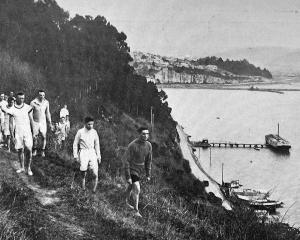To imprison such men is far from finding a cure for their crime-the word is not too strong to express the sin against society.
For next to loafing at large, loafing in gaol is the sort of existence they appear to enjoy.
Since in all modern prisons useless occupations like oakum picking and exercise of the treadmill kind have long since been abolished, some sort of useful work has had to be devised on the assumption that hard work is the way of salvation for the criminal.
If that work can be carried on in the open air, so much the better.
New South Wales, which for years has led the way in the adoption of a rational and scientific treatment of prisoners, has followed up its system of classification by the establishment of prison farms.
Here the men build, grow vegetables, and engage in other industries that are profitable not only to the benefit of health and morals but also as fitting them to earn an honest livelihood when their term of imprisonment ends.
Mr D. R. Hall, the Attorney-general of the State, who evidently takes a great interest in all that concerns the penal establishments of New South Wales, has given a glowing account of the success of the system, and he is now inspecting the system which has been adopted in this dominion under which prisoners are employed in tree-planting.
His visit suggests the view that a project advocated several years ago by the trustees of the Otago Benevolent Institution which is an extension of the principle underlying the tree-planting scheme might advantageously be put in force by the Government.
This is nothing more nor less than the establishment of a labour colony to which a magistrate might commit for suitable terms those loafers and ne'er-do-wells who decline to work for their own support or for the support of their dependants.
The result would be the inestimable benefit not only that every loafer would be compelled to work before he should be allowed to eat, and that the profit of this labour should help to support those who rightly depend upon him, but also that in time he might learn to love the work that was imposed upon him and that he might as a consequence be raised from this low level to the self-respecting position of a bona-fide worker.
One of the most vivid impressions of the visitor to the Otago Central district is the enormous number of rabbits to be seen in some localities, and the lack of interest shown in their destruction by the adjacent townships' residents.
The work of weeding them out appears to the casual visitor to be practically nil. Certainly, a fairly big industry has arisen in the export of frozen rabbits and skins, but it cannot be said that the return from this trade can be nearly as profitable as from the export of sheep.
Why the authorities in Central Otagodo not show more enterprise in taking steps to destroy the rabbits, for the sake of the ultimate advancement of their districts, is difficult to understand. - ODT, 19.1.1915.












